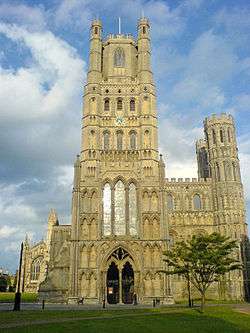Christopher Tye
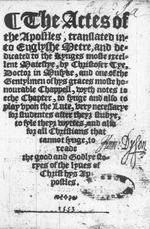
Christopher Tye (c.1505 – before 1573) was an English Renaissance composer and organist. Probably born in Cambridgeshire, he trained at the University of Cambridge and became the master of the choir at Ely Cathedral. He is noted as the music teacher of Edward VI of England and was held in high esteem for his choral music, as well as chamber works such as the polyphonic In Nomines. It is likely that only a small percentage of his compositional output survives, often only as fragments; his Acts of the Apostles was the only work to be published in his lifetime.
He ceased composing when he became a clergyman, returning to Ely Cathedral and later becoming rector of Doddington, Cambridgeshire. Today, he is perhaps best known for the hymn "Winchester Old", based on a theme from Acts of the Apostles, which forms the basis of the most commonly performed version in the United Kingdom of "While Shepherds Watched Their Flocks".[1]
Beginnings
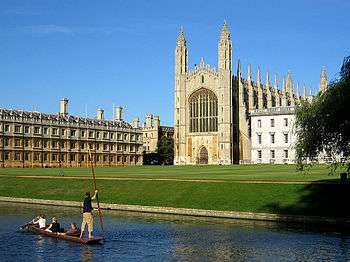
Christopher Tye is believed to have been born in Cambridge, England. Little is known about his origins. The first references to him are when he attended and received his Bachelor of Music degree in Cambridge in the year 1536. It is because of this that his birth date is believed to be around 1505. The next year, in 1537, he took up a position as a lay clerk at King's college. Based on recorded financial records we know that by 1543 he took up a more prestigious position as the Magister Choristarum at Ely Cathedral with an annual salary of ten English pounds. Shortly, thereafter, in 1545 the University of Cambridge saw fit to bestow upon Tye the degree of Doctor of Music.[2]
Work with the Royal Court
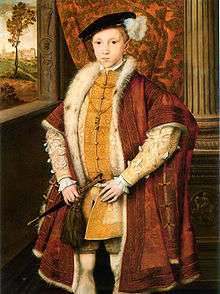
The composer's career shows that he had a strong connection to Dr. Richard Cox, who was a passionate church reformer and a tutor of King Edward (then Prince Edward). This affiliation would prove to have a strong influence on him for the rest of his life. Dr. Cox was also the person who very probably introduced Tye to the royal court. It is believed that this led to Christopher Tye being a kind of musical adviser of the court who worked closely with Edward.[3] In 1605, Samuel Rowley (believed to be Tye's grandson) wrote a play entitled, When You See Me, You Know Me. In the play, Tye and King Edward play important roles and exchange dialogue where Edward identifies 'Doctor Tye' as 'Our music's lecturer.'[4] Later, in 1553, Christopher Tye published for the first and only time one of his more well known works entitled, The Actes of the Apostles. In it he takes the ideas set forth in the book of 'Acts' in the Bible and sets them to meter. Although it was met with divided reviews (even today), the work is hugely important because it is dedicated to Edward.[5] In the preface he goes into some detail that implies a kind of friendship between the two. Although it is never mentioned explicitly, it is generally assumed that Tye held a position in the Chapel Royal Staff during the 1550s at some point.[6]
Religious posts
In 1558, Tye took up his posting again at Ely, probably at the request of his old friend, Richard Cox. Soon, thereafter, Tye took it upon himself to take up a place in the ministry and thus ceased to compose music.[7] Dr. Richard Cox, who was bishop at Ely during this time, ordained the composer as a deacon and later as a priest in the same year. In 1561, Tye resigned from the post at Ely and was appointed to Doddington, Cambridgeshire, the richest benefice in England.[8] He is believed to have died there before March 1573 when his successor was appointed, although no record is found of his death.[9]
Works
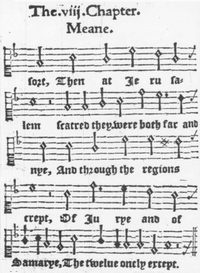
Only one of Tye's works, Actes of the Apostles of 1553, a verse translation of the Acts of the Apostles into four part harmony, was published during his lifetime. Compared to his polyphonic works, this work is not well regarded, although it is from this collection that his most familiar piece is derived; the most common tune of "While Shepherds Watched Their Flocks". Of his polyphonic choral works, some only exist in parts or excerpts.[10] For example, it was only after laboriously reconstructing a supposedly missing bass voice part of the anthem "To Father, Son and Holy Ghost" that the editor Vladimir Fedorov discovered the 'missing' part.[11]
However, as a pre-eminent court musician with strong Protestant leanings, Tye is generally considered to be one of the most influential English composers of his day. Even after his appointment in the ministry when his composing ceased, his reputation as a musician continued to spread. Perhaps even more impressive is the fact that he was a substantial enough character to be included in Samuel Rowley's play forty years later. Works such as O God, be merciful unto us are still performed today.[12]
Although known primarily for his Latin and English settings of sacred choral works, his In Nomines and other instrumental for four or five works survive, some of the earliest examples of chamber music.[13]
References
- ↑ The Harvard University Hymn Book (Harvard University Press, 2007), 426
- ↑ Paul Doe and David Mateer, "Tye, Christopher," in Grove Music Online, Oxford University Press, 2009, Accessed 22 September 2013, http://www.oxfordmusiconline.com/subscriber/article/grove/music/28665.
- ↑ Doe and Mateer, "Tye, Christopher," in Grove Music Online.
- ↑ Nan Cooke Carpenter, "Christopher Tye and the Musical Dialogue in Samuel Rowley's 'When You See Me, You Know Me,'" Journal of Research in Music Education vol. 8, no. 2 (Autumn 1960): 87, http://www.jstor.org/stable/3344029.
- ↑ Robert W. Weidner, “Tye’s ‘Actes of the Apostles:’ A Reassessment,” The Musical Quarterly vol. 58, no. 2 (April 1972): 243, http://www.jstor.org/stable/741305.
- ↑ Doe and Mateer, “Tye, Christopher,” in Grove Music Online.
- ↑ John Langdon, "Tye and His Church Music," The Musical Times vol. 113, no. 1556 (October 1972): 1011, http://www.jstor.org/stable/955291.
- ↑ Christopher Tye biography, Hyperion Records, accessed 14 December 2013
- ↑ Doe and Mateer, "Tye, Christopher," in Grove Music Online.
- ↑ Doe and Mateer, "Tye, Christopher," in Grove Music Online.
- ↑ Vladimir Fedorov, Fontes Artis Musicae – Volume 31, Numéro 1, 1984, 33
- ↑ Judith H. Blezzard, "Christopher Tye: A Quartercentenary Note,” The Musical Times vol. 114, no. 1568 (October 1973): 1051–1053, http://www.jstor.org/stable/955420.
- ↑ Robert W. Weidner, "The Instrumental Music of Christopher Tye," Journal of the Musicological Society vol. 17, no.3 (Autumn 1964): 363, http://www.jstor.org/stable/830095.
External links
- Free scores by Christopher Tye in the Choral Public Domain Library (ChoralWiki)
- Free scores by Christopher Tye at the International Music Score Library Project
